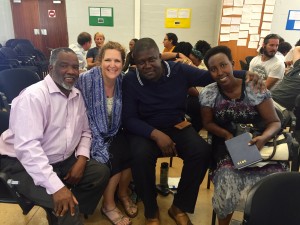A few years ago when I was a new parishioner at a big church, I grew incredibly frustrated at the slow or non-existent response to my e-mails and offers to help. I was studying theology, passionate about church in the changing religious landscape and home with two little kids. I had time on my hands and pent up vision and energy. I know that the pastors were insanely busy but they also missed gaining a very willing volunteer. I ended up putting that energy into graduate studies and becoming a pastor myself.
Now, I am on the other end. I receive a lot of emails and requests for my attention. I have many balls in the air at one time and sometimes one or two require more focused attention than the others, meaning I need to put off responding to others.
However, my experience haunts me. I know what it’s like to be waiting for an e-mail from someone in an influential position, and even though you may know how busy they are, it hurts when your deep concern isn’t on the top of the list. So, I do my very best to respond quickly and if I don’t, to apologize for my delayed response.
My friend Ken Evers-Hood has done some fascinating research connecting game theory with church leadership. One thing that he found is that how leadership rewards and punishes behavior is correlated to church growth. He says,
What is absolutely clear from this study is that leaders should reflect consciously on the ways they reward and punish the people around them. Church leaders’ rewarding behavior is usually pretty obvious — public thank-yous, for instance. But we may not realize the subtle, unhealthy ways we punish one another — being slow to respond to emails or voice mails, using “distancing” body language in meetings, sitting apart from people we wish to discourage.
I was taken with what Ken calls the “subtle, unhealthy ways we punish one another.” Those can be more powerful than the more obvious rewards in a community. As an introvert, this has been a growing edge, but I have learned that timely response, listening and initiating connection makes a huge difference. Taking the time to write a note, invite someone for coffee, or letting others know you see them goes a long way to helping people feel safe, seen and important. It increases participation and ownership in the work of the community and gives feet and fuel to the passions of others.
Most leaders don’t want to think of themselves as a person of power. However, the leaders that don’t acknowledge their power use it irresponsibly. They either lord it over everyone while claiming they have no power which makes it difficult to name how they may be abusing their power. Or they shrink back from response because they truly don’t believe they can make a difference and leave others around them unsure and guessing. Or they vacillate between the two responses which breeds resentment.
Leadership is a sacred gift that none of us deserve. However, ambivalence about it serves no one but ourselves. When we find ourselves in leadership, it requires faithful, intentional care and investment to bless those who we lead and help them to find who they are called to be.
To read more about Ken’s research, go here and let this article lead you to some of his other insightful writing.











